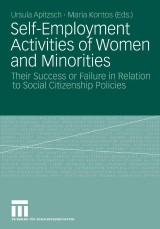Details

Self-Employment Activities of Women and Minorities
Their Success or Failure in Relation to Social Citizenship Policies|
53,49 € |
|
| Verlag: | VS Verlag |
| Format: | |
| Veröffentl.: | 08.02.2008 |
| ISBN/EAN: | 9783531908168 |
| Sprache: | englisch |
| Anzahl Seiten: | 221 |
Dieses eBook enthält ein Wasserzeichen.
Beschreibungen
This volume summarizes some results of the trans-national European research project „Self-employment activities concerning women and minorities: their success or failure in relation to social citizenship policies“ that was supported by the Directorate General Research of the European Commission within the Targeted Socio-Economic Research Program (TSER). The research was carried out over three years. We aimed at contributing to the knowledge of social exclusion and social integration through our analysis of non-privileged self-employment of na- ve women and migrant men and women in European countries. The research consists of comparative case studies in six European countries, in Northern and in Southern Europe. We concentrated on the study of four metropolitan regions, i.e., the Rhine/Main Region in Germany, Athens in Greece, Stockholm in Sweden, and London in the UK. In Denmark, the semi-metropolitan region of Aalborg and Aarhus were research sites. In Italy, we examined se- employment activities in the semi-rural region of Calabria. Research teams from the universities of Frankfurt/Main, Greenwich, Aalborg, Umeaå, Calabria, worked on the national cases of Germany, UK, Denmark, Sweden and Italy respectively, whereas the national case of Greece was conducted by the teams of the universities of Crete and Dundee and the Women’s Research Centre in Athens.
Methods and contexts.- Social exclusion and self-employment in European societies: An introduction.- The method of biographical policy evaluation.- Socio-economic contexts of self-employment.- Arenas of policy making.- Dimensions of European diversity in non-priviledged self-employment.- The biographical embeddedness of women’s self-employment. Motivations, strategies and policies.- Self-employment, autonomy and empowerment against patriarchal family structures.- Clientelism and family spirit. Some notes on self-employment policy in Calabria.- Gender, the family and self-employment: Is the family a resource for migrant women entrepreneurs?.- Collective self-employment of migrant women in Sweden. Biographical projects and policy measures.- Gendered professional strategies in self-employment.- Migrant men and the challenge of entrepreneurial creativity.- Highly educated and/or skilled migrants from third countries and self-employment in Greece: a comparison between men’s and women’s experiences.- Pontian newcomers in Greece.- Some conclusions.
Dr. Ursula Apitzsch is Professor of Sociology and Political Science at J.W. Goethe-University, Frankfurt/Main.<br>
Dr. Maria Kontos is researcher at the Frankfurt Institute of Social Research.<br>
<br>
Dr. Maria Kontos is researcher at the Frankfurt Institute of Social Research.<br>
<br>
The discussion on new forms of non-privileged self-employment of women and minorities is usually divided into separate discourses on women’s opportunities on the one hand and ethnic business on the other. The focus in the discussion about the special resources of migrant entrepreneurship has been above all on the assumed collective traditions of ethnic business and not on the individual emancipative resources of the self-employed. This book has brought the two discourses together. While women and migrants are most vulnerable to social exclusion on the labour market, at the same time they are subjects of unrecognized resources for self-employment that have to be taken into account under the special conditions of social citizenship policies in the European Union.
Success or Failure?
The discussion on new forms of non-privileged self-employment of women and minorities is usually divided into separate discourses on women’s opportunities on the one hand and ethnic business on the other. The focus in the discussion about the special resources of migrant entrepreneurship has been above all on the assumed collective traditions of ethnic business and not on the individual emancipative resources of the self-employed. This book has brought the two discourses together. While women and migrants are most vulnerable to social exclusion on the labour market, at the same time they are subjects of unrecognized resources for self-employment that have to be taken into account under the special conditions of social citizenship policies in the European Union.

















